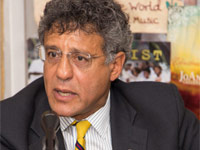
Not wanting to burden Bahamian businesses and consumers, the FNM government will not allow the Bahamas Electricity Corporation (BEC) to levy a temporary extra tariff in an attempt to recoup its estimated $5 million-plus Hurricane Irene repair costs, Minister Earl Deveaux confirmed yesterday.
Deveaux, Minister of the Environment, said the government had not yet received a detailed summary of the unexpected costs BEC incurred in its August-September 2011 restoration efforts.
He did say, however, that the government might consider other options once BEC’s management provided a detailed report and breakdown on the repair costs.
With an election around the corner, the Ingraham administration is loathe to increase costs to businesses and consumers. Last year, the Grand Bahama Power Company (GBPC) obtained permission from the Grand Bahama Port Authority (GBPA) to add a $0.03 fee to its fuel surcharge to cover the cost of bringing in rental generation units.
The move caused quite a bit of controversy in Grand Bahama, as many felt the need for rental units was due to internal efficiencies and should not be a cost passed onto customers.
“The Government is not… prepared to increase the tariff on the consumer. We would entertain a documented summary of the costs incurred, but we have not received either to date,” Deveaux said.
The idea of ‘one-time’ tariff was not well received by the Bahamas business community either. Chairman of the Bahamas Chamber of Commerce and Employers Confederation (BCCEC), Winston Rolle said that no other business had the “luxury” of passing on hurricane repair-related costs to customers. He did not think that BEC’s monopoly position should allow the corporation to do so.
With electricity prices in The Bahamas among the highest in the region, Rolle said it would be “detrimental” to the private sector for BEC to hike prices even further.
BEC Chairman, Michael Moss explained that the “time contingent, specific tariff” would recover the cost of September 2011’s hurricane repairs. Moss said such tariffs were standard practice in most developed countries.
He said BEC would put together detailed documentation related to hurricane repairs and submit the information to the government in hopes of receiving some kind of financial relief.
“We are still looking, hoping the Government will allow us to recover our unanticipated hurricane expenses, and allow us to reflect such a figure in the year-end 2011 accounts, which will make things look better than they otherwise would.
“If we don’t recover that, we will probably end up with a marginal loss, rather than the $5 million profit we were projecting,” Moss said.



